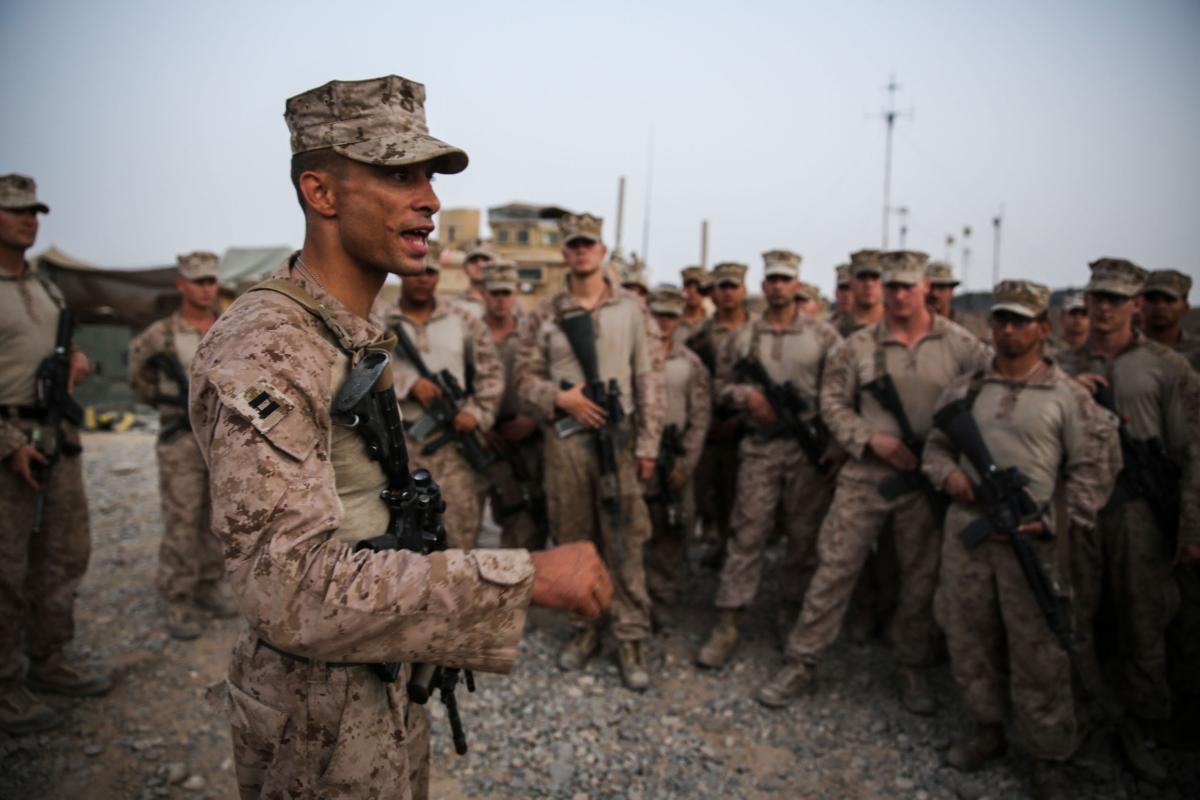Disagreement, debate, candor, and criticism are not just permitted but encouraged within the sea services. However, Marine Corps Lieutenant Colonel Stuart Scheller’s recent relief from command risks giving the appearance that this is not true. Can debate exist when military leaders who challenge policy are immediately cashiered?
Yes, it can—when done professionally. There is a fine line between honest critique and undermining faith in the chain of command. On one side, service members are given wide latitude to vigorously debate policy and practice. On the other, members risk conflating private opinion for official policy, can abuse the privilege of their office, and set bad examples to those they are charged to lead. This issue is simultaneously simple and complex.
The Video
Lieutenant Colonel Scheller, then the commanding officer of Advanced Infantry Training Battalion–East, posted a video on social media criticizing the decisions of the most senior leaders in the Department of Defense regarding foreign policy. He made this post shortly after the 26 August ISIS-K attack against U.S. military members and civilians at Hamid Karzai International Airport in Kabul, Afghanistan. Specifically, Scheller named or implied failures by the Secretary of Defense, the Commandant of the Marine Corps, and the commander of U.S. Central Command. Scheller claimed that none of these leaders advised the President against certain courses of action during the withdrawal from Afghanistan. Ultimately, he demanded accountability for what he claimed were foreign policy failures. Within hours, he was relieved from his position for a loss of trust and confidence in his ability to command.The video and its consequences went viral and engendered heated debate. Like many others, I have watched the discussions and comments play out on Facebook, LinkedIn, Twitter, and message boards. I also have fielded questions from peers and protégés attempting to understand this episode’s many factors. Some camps celebrated Scheller for his willingness to sacrifice his career for his principles, or for giving voice to some service members who share his opinion of the handling of the Afghanistan withdrawal. Other camps have roundly condemned Scheller for daring to question policy out of turn. Analysis of this discussion reveals significant confusion about the essential issue: Is honest, frank critique of policy and practice truly permitted?
Yes, it is! Examples abound. Then–active-duty Army Lieutenant Colonel Paul Yingling offers a stark contrast to Scheller in how to do so through two routes—publicly and within the institution. Publicly, Yingling published the article “A Failure in Generalship” in the Armed Forces Journal in 2007. He criticized general officers for perceived failures in their conduct of the post-invasion occupation of Iraq. While it certainly got a lot of attention—and he took a lot of flak for his views—it did not preclude him from being selected for promotion to the rank of colonel (though he chose to retire as a lieutenant colonel rather than accept promotion and stay on active duty). Inside the institution, and prior to the publication of the article, he expressed similar arguments in interviews for the Army’s oral history archives.
Some may claim that times have changed since 2007, making the contrast between Yingling and Scheller less relevant in today’s hypercharged social media environment. Criticism today can be seen more rapidly not just by more senior individuals, but also by their subordinates. The immediate and wide visibility of Scheller’s video, one could argue, got it in front of too many people, too soon, prompting the system to shut him down.
However, I have authored several recent articles that are highly critical of service policy and practice, concurrent with the continued rise of social media. The titles are largely self-explanatory, in that they are critical of either a policy or common practice within the Sea Services: “Mass Punishment Does Not Work,” “Don’t Just Shut Up and Row,” “The Accidental Marine Corps Commander,” and “Close the Door on Gender Barriers” were all published in Proceedings between 2019 and 2021. While I have found myself engaged in energetic debate after publishing each, I have yet to face reprisal and my career remains on track.
So, what’s the difference? What makes one case worthy of relief while other cases face no adverse consequences?
Standards of Conduct
The essential point is largely addressed in Department of Defense Directive 5500.7-R: Standards of Conduct. The pertinent section is paragraph 2-207, which concerns disclaimers for speeches and writings:
“A DoD employee who uses or permits the use of his military grade or who includes or permits the inclusion of his title or position as one of several biographical details given to identify himself in connection with teaching, speaking, or writing . . . shall make a disclaimer if the subject of the teaching, speaking, or writing deals in significant part with any ongoing or announced policy, program or operation of the DoD. . .”
Specifically, the speaker or author, “shall expressly state that the views presented are those of the speaker or author and do not necessarily represent the views of DoD or its Components.”
Regarding speeches or oral presentations, “the disclaimer may be given orally provided it is given at the beginning of the oral presentation.”1
In addition, authors should always be aware of the classification of any material they are discussing. If the information is classified or sensitive in any way—even unclassified information that may, in aggregate, lead to a compromise of classified information or disclosure of operational security—then a security review is required.2 If authors intend to discuss the official positions of their command, a public affairs review is necessary.
In reading Standards of Conduct, it is immediately apparent that service members have significant leeway in their speech and writing. The greatest restraint involves partisan political speech, to avoid the politicization of the military. The restrictions on political speech are covered in Department of Defense Directive1344.01: Political Activities by Members of the Armed Force. The dangers regarding such speech on social media are analyzed in detail in Dr. Heidi Urben’s Proceedings article, “Partisan Activity on Social Media Hurts the Military Profession.” Dr. Urben discusses several elements present in the Scheller case. In sum, service members must avoid partisan and insubordinate speech in the public sphere. Beyond that, though, active-duty military members are free to say and do a lot. They can even openly criticize policy and call for reform. Honest and open feedback is possible and common. It just must be done in the right way.
Thankfully, the professional military journals generally have disclaimers printed in every issue and on their digital platforms, extending this disclaimer to online material and associated podcasts. In the case of Proceedings, this disclaimer is found on page three of every issue. Other professionally run outlets include a disclaimer as a matter of course; the Center for International Maritime Security operates the Sea Control podcast, and the hosts issue the required verbal disclaimer at the top of each episode. This illustrates an essential benefit of expressing criticism in professional publishing outlets—they know the norms of the profession and serve as guard rails that can protect authors and speakers from themselves, especially as they are learning the ropes of public presentation in any format.
In the case of social media, each service has produced social media guidebooks that offer guidance nested within the Standards of Conduct. While they address the nuances of the social media landscape that the authors of Standards of Conduct did not anticipate, this guidance reasonably expresses the limitations imposed on conduct on social media platforms to avoid the appearance of partisan political activity or conduct or endorsement of activity contrary to any service policy. For example, just as service members cannot distribute literature on behalf of a partisan political activity, neither can they post direct links to a political party, campaign, group, or cause on social media.3
Finally, service members are not limited to public venues in offering lawful criticism. DoD and the military services have mechanisms that allow feedback to rise up the chain of command without assuming the risks addressed in the Standards of Conduct. Submitting materials to centers of excellence, centers for lessons learned, and historical branches, as well as writing information papers and after-action reports are just a handful of the many ways available to service members. Each has a different reach and scope, yet each offers its own utility to service members who want to make a difference.
Walking the Line
Debate and discussion are prerequisites for the growth and improvement of the U.S. military. Senior leaders encourage frank examination of service policy and practice, including writing in professional journals such as Proceedings. Junior and midgrade military leaders are challenged to “enter the arena.” But even cage matches have rules, and for good reason.
While I refer to the recent Scheller case, my argument is not about that case or the people involved. Rather, it is about teaching service members how to share their insights responsibly and professionally, because the military needs their thoughts now more than ever. In offering their thoughts, they must also be taught—most importantly through the example of those senior to them—to do so while respecting their obligations as leaders who have sworn oaths to the Constitution. Honest criticism and professionalism are not mutually exclusive. Rather, they are complementary. In criticizing, we must remain, first and foremost, responsible leaders.
- Office of the Secretary of Defense, Department of Defense Directive 5500.7-R, Standards of Conduct (Washington, DC: Department of Defense, 2011), 20.
- Office of the Secretary of Defense, Department of Defense Instruction 5230.29, Security and Policy Review of DoD Information for Public Release (Washington, DC: Department of Defense, 2014), 6.
- United States Navy, Social Media Handbook (Washington, DC: U.S. Navy, 2019), 4.






